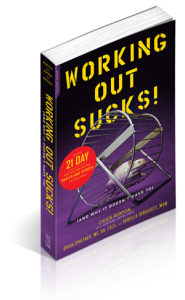
Technology gives us the illusion of accomplishing more
by allowing us to physically accomplish virtually nothing.-Chuck Runyon, Working Out Sucks!
Boy howdy, ain’t that the truth.
Chuck Runyon is the co-founder and CEO of Anytime Fitness, that 24-hour gym that probably recently opened up not too far from you. Before that, he was a salesman and a marketer generating new memberships to fitness clubs. And therefore, he’s pretty much an expert in the excuses we give to not sign up for that gym membership, even though we have that nagging thought that we could probably stand to move more, exercise more, weigh less, be healthier.
He also has a personal story that moved me to tears as I read it, sitting on my bum, waiting for Cass to be done basketball practice.
I’ve read a number of motivational books, some of which deal with health and weight loss (a personal favorite being Peter Walsh’s Does This Clutter Make My Butt Look Fat?) and the Honey Badger Mom in me loved this one. Because Chuck Runyon lists every excuse in the book and then relentlessly destroys each one.
No time? That’s odd, because most people will list their health as a top priority (#2, after family). The average person would work out 90-120 minutes a week. That’s 1% of your weekly time. Our willingness to work for our priorities is seriously effed up.
Ever say you didn’t care if you were carrying a boy or a girl, “as long it’s healthy?” Runyon makes the astute but cutting observation that after that baby is born, all too often it’s raised on a not-at-all-healthy diet full of toxins, sugar and processed foods.
The average American spends more money in one month of automobile expenses than he or she does one year of personal fitness-related expenses.
Yeah. Unless you’re a first-timer here, you already know how I feel about that. (It’s not good.)
And so on and so forth. I can guarantee that any reader will find a chapter (or several) that really resonates and puts you on notice. And you know why?
Because health… ultimately… is essential to life. We all die anyway, but being unhealthy makes it much more likely to happen sooner. And our quality of life suffers. And we know this, and we make excuses to ourselves. We feel guilty about it on some level, but neglect to act, so subconsciously it becomes an open sore.
Which is despicable when you really think about it, and when Runyon hits on your excuse, it feels raw.
I like facts and statistics. A lot. But let’s face it: we hear them every day and we’ve become very good at blocking them out. That feeling of raw is when you start to doubt your own excuses, when you rip off the bandaid of rationalization and realize you are working against yourself and your own best interests.
That’s when the seeds for change are planted.
At this point the book transitions and psychologist Rebecca Derossett takes over. Psychology fascinates me, so I ate this section of the book up; for those slightly less dorky than me, all the matters of the brain are illustrated by real and inspiring stories of people who have made profound changes for a better life. Goal-setting is covered, and visualization, and overcoming negative thinking, and the movement to brain connection, and the inability to start thanks to the curse of perfectionism. Action plans are laid out, step by step. No excuses.
So now you’ve faced your excuses and have been given a roadmap to overcoming your emotional and intellectual obstacles; what next? Dietician Brian Zehetner patiently separates food facts from fiction, setting you up with a nutritional game plan: because health is just as much achieved in the kitchen as it is in the gym. (This is the one area I had an issue with. Surprise surprise, allow me to remind you of my Food Police status. The argument is set forth that HFCS isn’t really any worse than sugar, and Zehetner has “no problem recommending” artificial sweeteners. I take issue with both statements, standing firmly in the camp of the less processed, the better; but since the end result is the advice to limit all 3 as much as possible I’m not going to raise a stink about it.)
The book concludes with info about working out– cardio, strength training– and lays out a 21 day food and fitness regime for the list-oriented and “I don’t know where to start” crowd. Talk about no excuses: it’s all there. Just do it.
Hey. Just read it.
 I’ve got three copies of Working Out Sucks! (And Why It Doesn’t Have To): The Only 21-Day Kick-Start Plan for Total Health and Fitness You’ll Ever Need
I’ve got three copies of Working Out Sucks! (And Why It Doesn’t Have To): The Only 21-Day Kick-Start Plan for Total Health and Fitness You’ll Ever Need to give away.
To enter to win:
I need you to comment on this post and hit me with an excuse you’ve given in the past for not working out.
You can have a second entry:
by tweeting I want to win #WorkingOutSucks and beat my excuses- and make @robinelton proud. You’ll need to leave me a second comment letting me know you did that because I forget stuff.
Working out sucks, sure. Secretly blaming yourself because you know you could be better? Sucks more.
Do yourself proud. Make your kids proud, your mom proud. Make me proud. I like feeling proud of people.
__________________________________
I’ll pick 3 winners at random at noon EST on Tuesday January 24th. But if you don’t win, think about picking up a copy anyway. 100% of net proceeds benefit Limbs for Life, a nonprofit which provides fully functional prosthetic care to those otherwise unable to afford it.
__________________________________
Disclosure: I’m Community Manager for FitFluential LLC (come tweet with me). Anytime Fitness is a client of FitFluential. The book I reviewed and the copies I am giving to readers were provided by the client. All thoughts and opinions in the post are my own.
__________________________________
Awesome photo courtesy of the Library of Congress through Creative Commons. “Hop” Harry Stone, “the American Newsboy Champion Lightweight,” the second fighter in boxing history to have over 200 recorded fights without ever suffering a K0 or TK0 loss.